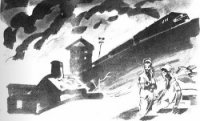Operation Nemesis: The Assassination Plot that Avenged the Armenian Genocide - Bogosian Eric (мир книг .txt) 📗
TEHLIRIAN: I’d made no decision.
LEHMBERG: Did you even know that Talat Pasha was staying in Berlin?
TEHLIRIAN: No.
When the district attorney mused, “Just one thing seems odd to me—that the accused man found an apartment in Hardenbergstrasse so quickly,” the point was rapidly passed over and the line of questioning dropped. Had this anomaly been given any attention by the police, they soon would have uncovered Tehlirian’s associates.
Piece by piece, the facts at hand were either fitted into Tehlirian’s version or discarded. When he was asked whether he had scars on his body, he replied, “Indeed I do!” implying that the scars were a result of his experience in the death caravan. But he had not received his wounds as a hostage; he had received them as a soldier. His fainting spells were attributed to the trauma of the deportation. He was not asked whether he had always suffered from these fits. No one questioned his version of how he came to have so much cash on him at the time of his arrest. No one questioned how a young man from the Anatolian countryside was able to travel around Europe with such easy familiarity. No one questioned how he spent his time in Berlin, hour after hour, day after day. Did he really study German all day, every day?
And where had the gun come from?
A gunsmith, “expert witness Barella,” testified. “The pistol has an eight-to nine-millimeter-diameter barrel. It has been officially approved for use by the German army. It’s a so-called ‘self-loading weapon,’ from which eight bullets can be fired. It is war surplus and carries the year nineteen fifteen from the Deutsche Waffen-und Munitionsfabrik. The ammunition is also war surplus.” The pistol used was probably a Luger P-08. The 9mm Parabellum has more explosive kick than the normal 9mm because the automatic mechanism gives the bullet more of a surge. Also the bullet is larger than the normal 9mm. The Luger was a soldier’s handgun.
LEHMBERG: Defendant, did you ever use the weapon earlier on?
TEHLIRIAN: No.
Tehlirian’s first landlady stated that she never saw a pistol in Tehlirian’s luggage. Testimony was provided that the pistol was in good condition if not new. So where did the Luger come from? Apparently there was no interest in providing an answer to this mystery either. Furthermore, Tehlirian, supposedly a student with no military background whatsoever, had killed a man with one shot. How had he been able to do that? No one bothered to ask.
In the most illogical reasoning of the trial, even when it was clear that Tehlirian had moved to a new apartment directly across the street from his victim only a few days before the killing, he insisted that there was no premeditation.
LEHMBERG: On the fifth of March you moved in at Frau Dittman’s. For what reasons?
TEHLIRIAN: When my mother appeared before me, I made the decision to kill Talat. I changed apartments for this reason.
LEHMBERG: And, so to speak, prepared the deed?
TEHLIRIAN: After my mother ordered it, the next day I told myself I had to kill him.
LEHMBERG: And from that time on you tried to convert the thought into action?
TEHLIRIAN: After moving into the new apartment, to some extent I forgot what my mother told me.
LEHMBERG: Forgot?
TRANSLATOR ZAKARIAN: This can’t be translated. We could say “dropped it,” let the thought drop.
LEHMBERG: I think [you’re saying] you’d just moved into the new apartment because your mother reproached you for being unconcerned.
TEHLIRIAN: I started to reflect. I told myself: How can you kill someone?
LEHMBERG: You asked yourself how you could be capable of killing Talat Pasha?
TEHLIRIAN: I told myself: I’m not capable of killing someone.
LEHMBERG: I don’t really understand this. Earlier you answered that since that day you had decided to move to Hardenbergstrasse; so you must have known that Talat Pasha lived across from you.
TEHLIRIAN: Yes.
LEHMBERG: So you wanted to live near him?
TEHLIRIAN: When my mother said that to me.
LEHMBERG: Then you decided—and what was the decision?
TEHLIRIAN: That I want to kill him.
LEHMBERG: Now tell us: Is it correct that already beforehand you’d realized Talat Pasha was living in Berlin?
TEHLIRIAN: Yes, about five weeks earlier I saw him.
LEHMBERG: Where?
TEHLIRIAN: He was walking on the street with two other men from the direction of the zoo. I heard Turkish being spoken near me and one of the men being addressed as “pasha.” I turned around and saw that this person was Talat Pasha. I walked behind them until I came to a cinema. Before the door of the cinema I saw that one of the other men was leaving. He kissed Talat’s hand and addressed him as “pasha.” The two other men entered a house.
LEHMBERG: At the time that you, so to speak, made this acquaintance, did the idea already occur to you to kill Talat?
TEHLIRIAN: The idea didn’t occur to me. I only felt bad, and when I was walking into the cinema it seemed to me that all the pictures of the massacre were rising up before me, and I walked back out of the cinema and went home.
LEHMBERG: And that was, as you said today, four to five weeks before this move to Hardenbergstrasse?
TEHLIRIAN: Yes.
LEHMBERG: So it’s not correct that you’d already learned earlier that Talat Pasha was staying in Berlin?
TEHLIRIAN: No.
Lehmberg addressed the court, clarifying, “I’m asking this because in earlier proceedings the defendant said at one point he came to Berlin because he wanted to study in Berlin and also had learned that Talat was staying in Berlin.”
DEFENSE ATTORNEY VON GORDON: What’s been said today roughly corresponds to the defendant’s last previous statement that around two weeks before the deed the appearance of his mother’s spirit sparked the decision to kill Talat Pasha. He thus also last indicated that he moved to Hardenbergstrasse for this reason.
TEHLIRIAN: Yes.
LEHMBERG: From that point onward, did you make it your business to observe and control Talat Pasha in his everyday life?
TEHLIRIAN: No, after moving into the new apartment I wanted to do my usual everyday work.
A smorgasbord of facts had been served up. The court was informed when Tehlirian first saw Talat, when he first decided to shoot Talat, and that he soon “forgot” about his decision. And yet he’d moved to an apartment directly across the street from Talat’s residence. At this point von Gordon addressed the judge.
DEFENSE ATTORNEY VON GORDON: I didn’t entirely understand a remark made a little while ago. Did I understand correctly that after finding the apartment in Hardenbergstrasse in order to be close to Talat, the defendant afterwards at times dropped the idea [of murdering Talat] because the thought occurred to him: You can’t kill another person?! To put it briefly: Did this decision he made after the spirit’s appearance stay firm, or did he sometimes drop it and then devote himself to his usual occupations, because he said to himself: You can’t kill someone?
LEHMBERG: That’s indeed what he said; he wavered in his decision.
TEHLIRIAN: I did waver. Whenever I felt sick, I wanted to honor my mother’s command. But when I was well again, I said to myself: You can’t really kill someone.
This “wavering,” in combination with Tehlirian’s proclivity for fainting, became the linchpin of the defense. This convoluted logic was argued back and forth to the very end of the trial. When did he decide to kill Talat? How confused was he when he experienced his fainting spells? The court, avoiding the problematic logic of Tehlirian’s preparations to kill Talat, roamed to and fro while trying to gain some insight into the man himself. When directly asked why he had happened to move across the street from his victim, Tehlirian repeated an unsubstantiated medical reason, something having to do with the amount of light in his room. Again, he was never questioned directly about the clearly predatory nature of his actions.




